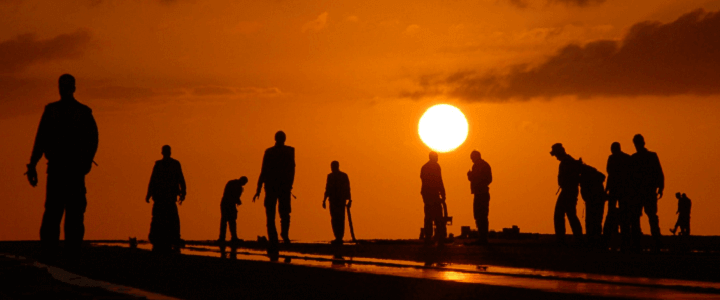Recently, I was invited by the incredible team behind the Bombshell podcast for a live recording at the National World War I Museum in Kansas City. It was a lively discussion, with topics ranging from the civil-military divide, government transparency and accountability, and our efforts in the “Forever Wars.” But the subject that seemed to capture the audience the most that night was Hollywood’s portrayal of the military on both the large and small screens.
The topic itself was timely. Just the week prior, Tom Hanks spoke on the issue at an event hosted by the Elizabeth Dole Foundation in Washington, DC. During his comments, Hanks noted, “I don’t know that Hollywood could create as authentic a story about Iraq or Afghanistan or people on their fourth, fifth, sixth tours of duty that couldn’t be told much, much better by a documentary or caring news media.” Hanks brings perspective on the issue rare among his colleagues in Hollywood. He earned an Academy Award nomination for his role as Army Captain John Miller in “Saving Private Ryan” and wrote, directed, and produced the HBO miniseries “Band of Brothers.” In other words, his opinion matters.
As we explored this subject during the podcast recording, one of the hosts inevitably raised the specter of “The Hurt Locker,” the Oscar award winning film about explosive ordnance disposal operations in Iraq that was almost universally panned by members of the military as unauthentic, unrealistic, and unworthy of the praise it received from the Hollywood elite. No matter how many times I read the glowing review of the film in the Los Angeles Times, I can’t remember a single time I’ve used the phrase “crackling verisimilitude” in a sentence. Nevertheless, one of our panelists, New York Times journalist Josh Ismay – himself a former Navy EOD officer – remarked that the movie is a good story, even if it requires viewers to suspend some semblance of belief. “If they told the actual story of what it was like to be an EOD tech in Iraq, the movie would be four hours long and classified.” And boring, no doubt.
When it comes to making films, Hollywood can tell a good story or tell a story good (grammatical errors intended). There isn’t much room in between. If you tell a good story, it draws audiences; it’s art. If you tell a story good, it draws a niche audience; it’s a documentary. If Hollywood told more stories good, they’d be longer and far less interesting for viewers. At its core, contemporary combat operations are best described as lengthy periods of absolute boredom punctuated by intense moments of insanity. Hollywood turns that formula upside down because it makes for better storytelling. You can only tell a “Pentagon Wars” story once; there’s just not a lot of opportunities today to recount the adventures of the staff officer who squeezed a fifth block into a quad chart. That’s just not going to make the cut on the editorial room floor.
What Hollywood can – and should – do better
Hollywood should, however, do a better job of portraying veterans and members of the military. We’re not all stoics. Few of us are “broken.” Most of us deal well with the ghosts of war. Every time a film or television program casts a veteran or service member in a negative role, it does a disservice to who we are, the values we represent, and the oath we take in defense of our Constitution. During his Dole Foundation comments, Hanks noted, “I don’t think there’s any more stereotypical character than a twisted veteran who’s never going to be the same. The reality is, when you talk to people and hear these stories, people are just trying to get on with the rest of their lives.”
I can deal with the occasional bad military movie. I can even survive some of what passes for military-based television programs today. What exhausts me are the stereotypical roles we see ourselves cast against. We are real people with real lives that sometimes involve real problems. We’re not all Navy SEALs. We’re not all living on the edge of sanity. We’re not all Christopher Walken in “The Deer Hunter.” Most of us, sadly, are probably a lot more like Kramer from “Seinfeld.” We’re everyday people. Well, for the most part, anyway.
Hollywood can – and should – do better.



